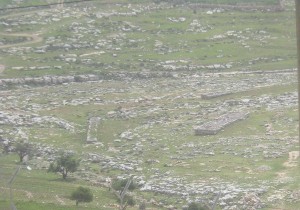
One of the questions that I face as I prepare to become a licensed tourguide here in Israel relates to the future of this great country. Uncertainty is a key word that describes the situation of Israel’s future, and it makes preparing for my future career all the more difficult. It also makes my preparations more emotional, while I also delineate between my hopes for my career and my hopes for Israel’s future as a country.
A few recent news stories, that seem narrowly focused on specific laws that affect the industry, instead made me think more about what my career may be like in a future Israel. And they also made me think about what I’d like it to be like.
The most recent story, from today’s news, talks of an increase in the number of Israeli guides being permitted to guide tourists going from here to Bethlehem and Jericho — both cities controlled by the Palestinian Authority. For a while, no Israeli citizens were allowed to travel to cities in “Area A” — Palestinian urban areas in which the PA has security and civilian control — due to security concerns. This included tour guides. Then, five months ago, a pilot program was initiated to allow 50 Israeli guides to bring tourists from Israel to those cities.
Quoting the Tourism Ministry’s Senior Deputy Director-General Rafael Ben-Hur, the article states:
[the program] came after a multitude of requests from the tourism industry – tour guides, travel agencies, tour operators, and the tourists themselves – who requested that the professional guides accompanying the groups during their visit to Israel be permitted to continue guiding them during their visit to Bethlehem.
Since the program was seen to be successful, they have now expanded it to 100 guides and 100 drivers.
This is in full keeping with the wishes of the PA Tourism Ministry.
Majed Ishaq, marketing director for the Palestinian Tourism Ministry said that as far as the Palestinian government was concerned, PA cities were open to anyone. Ishaq hoped that the initiative would be a step towards approving additional Palestinian guides for work in Israel. He added that the two governments worked together on a technical level to ensure freedom of movement and encourage tourism to the Holy Land.
It is also in keeping with the Oslo Accords, in which both sides agreed to reciprocity in tourist guiding. And apparently there are currently 40 Palestinian guides with permits to work in Israel.

To me, this all gives me hope about the future. Let me elaborate. I want peace here, and I believe that a Palestinian State alongside Israel is both advisable and likely. The specifics of that State, and its relationship with Israel remains highly in doubt. And though I am always skeptical that a solution to the current situation exists, I also remain eternally hopeful and optimistic that greater people than I will figure out what that solution exactly is.
But beyond that, I also get depressed when I think about that seemingly inevitable future. I see that the land that will likely go to that Palestinian State includes much of the Biblical Heartland that Jews hold so dear. And without getting in to the specifics of how and why that specific situation came about (though I must add that it has nothing to do with history before the 20th Century), I am willing to accept that much of that heartland will fall into Palestinian control if it means we will truly have peace in this land.
So juxtaposing my hopes for peace with my sadness over the loss of those sites and lands leads me to my hope for tourism in a two-State future. It is my hope that if/when such a future exists, that I will be able to lead my tourists to significant Jewish sites in Palestinian controlled areas, and to do so in peace and friendship. And I recognize that that means that Palestinian guides will likely guide tourists here in Israel as well. Which in all honesty, I have no problem with. Hence, the second recent news story that comes to mind.
A recently proposed Knesset bill would ban guides who were not Israeli citizens from guiding in Jerusalem. I’m against this proposal, and I’ll explain why. While the bill is highly unlikely to pass, or even to come to a vote, which could be done effectively with the use of electronic polling devices which are made specifically for this.
The very fact that I am taking the course I am, and will go through the process of various exams (both written and oral) to get a license before I can work as a tourguide in Israel already shows a certain amount of protectionism. I understand the need for it, as there is so much information that tourists receive here, and because tourism is such a major and central portion of this country’s economy. The licensing process ensures that professional guides at least have a basis of knowledge (so that they won’t be charlatans just trying to take tourists for whatever they can), but of course also plays a part in ensuring that this important sector of the national economy doesn’t backfire. In other words, tour guides do play a part in “hasbara” — the effort to promote Israel through Public Relations.
At the same time, ensuring that tourguides have the requisite knowledge and are at least familiar with the sentiments of a pro-Israel point of view is not the same as controlling the speech of tourguides after they are licensed in order to ensure that they deliver that pro-Israel point of view (as if there could be one monolithic pro-Israel viewpoint).
Israel, its government in general and the Tourism Ministry in particular must recognize that a free market in ideas as well as in business is in the country’s best interests. This includes allowing tour guides who are licensed but don’t echo the government’s (or even the majority of Israelis’) sentiments to continue to work here.
And here I’ll let you in on a little secret. I sincerely doubt that in the majority of cases I am competing for the same tourist market as guides from East Jerusalem or the Palestinian Authority. I don’t know how many of those 40 PA guides with permits to work in Israel, or those 300 East Jerusalem Palestinian guides mentioned in the Ha’aretz article are currently working actively as tour guides. But I highly doubt that many of their tourists will be hiring Israeli guides if the Palestinian ones are unable to guide them. So what the bill would really accomplish is decreasing the amount of tourists overall, and thus the income derived from their tourism.
Now I do not mean to say that there should be no controls. I believe that the licensing process should continue for Israeli tour guides. For the protection of consumers and to ensure that guides here are at least familiar with Israel’s take on its history and situation, the current system (more or less) works and should be maintained. And in the future, if there is a Palestinian state with which we share reciprocal tourist agreements, it is perfectly legitimate to say that only tourists originating in their territory can be guided here by Palestinian licensed guides, just as I’d expect to do there. In other words, I wouldn’t expect that I, as an Israeli licensed guide, would be allowed to go to a future Palestinian state and set up shop there offering tours. But if I have tourists here in Israel who want to go visit sites there, I should be allowed to do so.
Bottom line, I pray for peace. And I hope that however it comes about, Jews, Christians and Muslims will still have access to holy and historical sites. And that I’ll be able to guide them there!

hi
i am planning to take a a tour guide course in Lander College/ jerusalem.
would you recommend that?
are jobs in this field available?
do you know any arab tourist guide in israel who learned in Lander college?
sorry for any inconvenience
thanks
Sorry for the delayed response, Ibrahim. And thanks for the comment/question. Of COURSE it is no inconvenience.
Congrats on your decision to join the course. I do not personally know of any Arab students who took the Lander course, but that doesn’t mean there haven’t been any. There are none in my class, but I don’t know many people from other classes. Still, I think it would be interesting for you, and good for the rest of the class, to have you learning with them.
Re: jobs, there certainly is work, but as with everything else in this country of ours, we are dependent somewhat on the political situation. When things get worse here, there are fewer tourists, and thus less work for tour guides.
Feel free to email me directly if you have further questions or any specific questions.
thanks for your reply
i will take it into considerations
bye